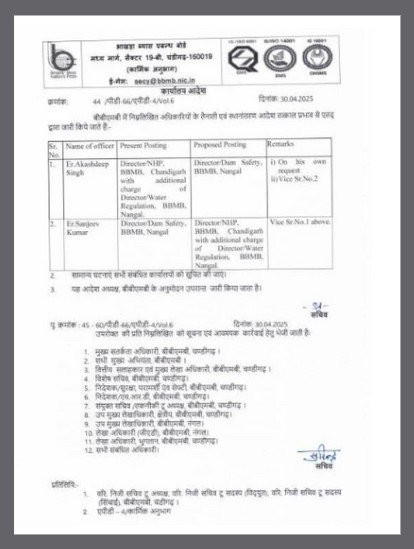
“Nayab Singh Saini Slams Punjab CM Over Water Dispute | Demands Fair Share for Haryana”
- HARYANAPOLITICS
- May 1, 2025
- No Comment
- 15
A State’s Struggle for Water: CM Nayab Singh Saini Urges Rethink as Crisis Deepens As India enters the height of summer, the swelling water crisis has once again brought inter-state tensions to the forefront. At the heart of the matter is the growing desperation for equitable water distribution, particularly in one northern state, where Chief Minister Nayab Singh Saini has raised urgent concerns about diminishing supply and increasing demand. The CM recently highlighted a critical issue: the state, which typically receives around 4,000 cusecs of water during the year, is now grappling with an even greater shortfall. In previous summers, water supply was increased to 9,000 cusecs to help cope with the soaring demand during peak heat. But this year, that essential seasonal augmentation is at risk of being withheld. Speaking candidly, Saini said he had earlier received a verbal assurance from leadership in the neighboring state that the additional water would continue to flow. However, in a public turnaround, that assurance was withdrawn, with the neighboring state claiming sole ownership of the water. The CM responded firmly: “Water is a natural resource. It does not belong to any single state.” This assertion reflects both legal and moral dimensions of India’s ongoing inter-state water disputes. Under previous agreements, water sharing was framed not only by geography but by an understanding of mutual dependence. In a country where rivers cross state boundaries and where water sustains not just agriculture but entire communities, unilateral control is a volatile proposition. The current situation is deeply concerning. With rising temperatures, water demand for both domestic consumption and irrigation has surged. Villages and cities alike are reporting reduced availability, forcing many to rely on tankers and alternative sources. This has led to growing frustration among the public and mounting pressure on government agencies to ensure that basic needs are met. For Saini, the issue is more than political. It’s about fairness, human dignity, and the shared responsibility of managing scarce resources in a federal structure. His appeal is for dialogue and reconsideration—an attempt to return to the spirit of cooperation that has historically governed inter-state agreements. This water crisis, like many others in India, underscores a larger environmental challenge. Groundwater depletion, erratic monsoons, and population growth have all strained the system. Experts warn that unless states coordinate better and invest in sustainable water management, such conflicts may become routine rather than exceptional. In the coming weeks, all eyes will be on how leadership across borders responds. The hope, as expressed by Saini, is that empathy and pragmatism will prevail over political one-upmanship. After all, as he emphasized, water is not just a resource—it is a right. This article is auto-generated based on verified news sources and does not substitute editorial opinion. #WaterCrisis #IndianPolitics #InterStateDispute #NayabSinghSaini #ClimateAndConflict



